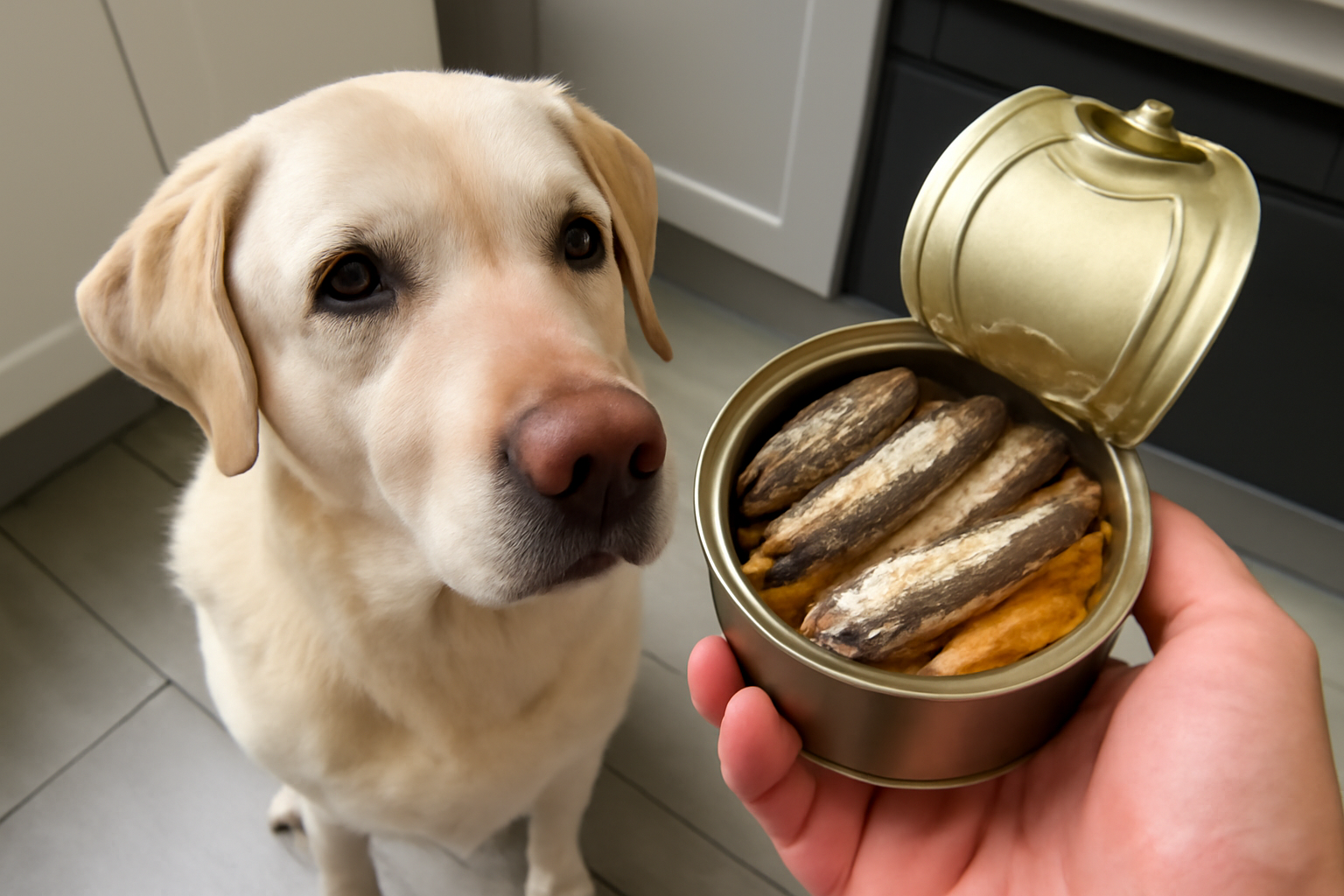Can Dogs Eat Sardines in Olive Oil? 🐕🐟
Sardines are small, oily fish that are packed with nutrients. They are often considered a superfood for humans because of their rich content of omega-3 fatty acids, protein, and essential vitamins like vitamin B12 and vitamin D. But what about dogs? Can dogs eat sardines in olive oil?
As more pet owners look for healthy and natural treats for their furry friends, sardines have gained popularity as a nutritious option. However, while sardines can offer a range of health benefits, feeding them to your dog in olive oil may come with some important considerations. In this article, we will explore the benefits, risks, and guidelines for feeding your dog sardines in olive oil.
What Are Sardines? 🐟
Sardines are small fish that belong to the herring family, and they are typically found in the Mediterranean Sea, the Atlantic Ocean, and the Pacific Ocean. Sardines are available fresh, frozen, or canned, and they are often preserved in various ways, including water, tomato sauce, or olive oil.
Sardines are known for their rich omega-3 fatty acids (EPA and DHA), which are great for heart health, brain function, and joint health. They also provide high-quality protein, vitamins, and minerals that are essential for overall health.
Can Dogs Eat Sardines in Olive Oil? 🐶
The short answer is: Yes, dogs can eat sardines in olive oil, but with some important considerations. While sardines themselves are highly nutritious, the olive oil they are packed in may have added calories and fat, so you need to feed them in moderation.
When feeding sardines in olive oil to your dog, you should consider the amount of oil, the sodium content, and whether your dog has any sensitivities to fatty foods. It’s important to be mindful of these factors to ensure that your dog enjoys the benefits of sardines without the risks associated with excessive fat intake.
Health Benefits of Sardines for Dogs 💪
Before diving into the risks, let’s take a look at the health benefits that sardines offer for dogs:
- Rich in Omega-3 Fatty Acids 🧠💓:
Sardines are packed with omega-3 fatty acids, particularly EPA (eicosapentaenoic acid) and DHA (docosahexaenoic acid). These fatty acids are crucial for promoting a healthy heart, supporting brain function, and improving joint health. Omega-3s also help reduce inflammation in the body, which is beneficial for dogs suffering from conditions like arthritis. - High-Quality Protein 💪:
Sardines are an excellent source of protein, which is essential for building and maintaining muscle and tissue. Protein helps with growth, repair, and immune function. Sardines provide a natural, highly digestible source of protein that supports overall health. - Rich in Calcium 🦴:
Sardines are a great source of calcium, which is essential for maintaining strong bones and teeth. The calcium in sardines, along with the small bones found in the fish, contributes to your dog’s bone health. Calcium is especially important for growing puppies and senior dogs who may need extra support for their bones. - Vitamins and Minerals 🧑⚕️:
Sardines are rich in several essential vitamins and minerals:- Vitamin B12: Supports nerve function and energy production.
- Vitamin D: Essential for bone health and calcium absorption.
- Selenium: Acts as a powerful antioxidant to protect the cells and boost the immune system.
- Supports Joint Health 🦴:
The omega-3 fatty acids in sardines help reduce joint inflammation, promote joint mobility, and improve overall joint health. This makes sardines a great choice for dogs suffering from arthritis or those that are prone to joint problems due to age or breed.
Risks of Sardines in Olive Oil for Dogs ⚠️
While sardines offer many benefits, there are some risks associated with feeding them in olive oil:
- High Fat Content 🧈:
Olive oil is high in fat. While the fats in olive oil are healthy monounsaturated fats, too much fat can lead to weight gain, obesity, or even pancreatitis (inflammation of the pancreas) in sensitive dogs. Therefore, it’s important to feed sardines in olive oil in moderation and to adjust your dog’s food intake to account for the extra fat. - Sodium Content 🧂:
Many canned sardines come with added salt to preserve the fish. Excessive sodium can lead to dehydration, high blood pressure, and kidney issues in dogs. When choosing sardines, make sure to select those that are packed in water or olive oil without added salt. Rinsing the sardines under cold water can also help remove excess sodium. - Excess Calories 🍽️:
Sardines in olive oil are calorie-dense due to both the fish and the oil. Overfeeding sardines in olive oil can lead to weight gain in dogs that are not very active. Make sure to feed sardines as an occasional treat and adjust your dog’s regular meals to account for the extra calories. - Digestive Upset 💩:
Some dogs have more sensitive stomachs, and introducing new, fatty foods like sardines in olive oil can cause diarrhea, vomiting, or gas. Start with small portions and monitor your dog’s reaction. If they show signs of discomfort, discontinue feeding sardines or switch to sardines packed in water without oil.
How to Safely Serve Sardines in Olive Oil to Dogs? 🍽️
If you decide to feed your dog sardines in olive oil, follow these guidelines to ensure it’s done safely:
- Choose Sardines Packed in Water or Olive Oil Without Added Salt 🧴:
Always check the label to ensure the sardines are packed in olive oil that has no added salt, preservatives, or spices. Sardines in water are often a better option because they have fewer added fats and sodium. - Drain the Excess Oil 🧴:
Olive oil can add extra fat and calories, so it’s a good idea to drain the oil before serving sardines to your dog. If you’re worried about the fat content, you can also rinse the sardines under water to remove any excess oil. - Serve in Moderation 🥄:
Sardines in olive oil should be treated as an occasional treat, not a regular part of your dog’s diet. Limit the amount to once or twice a week. A good rule of thumb is to serve half to one sardine for larger dogs and smaller portions for smaller dogs. - Monitor Your Dog’s Reaction 🐾:
Whenever introducing new foods, it’s important to monitor your dog’s reaction. If you notice any signs of digestive upset, such as vomiting, diarrhea, or lethargy, discontinue the treat and consult your vet. - Consider Alternative Options 💧:
If you’re concerned about the oil content, consider feeding your dog sardines that are packed in water instead of oil. These options still provide the health benefits of sardines without the added fat and calories.
Nutritional Value of Sardines in Olive Oil for Dogs 🧑⚕️
Here’s a breakdown of the nutritional value of sardines in olive oil per 100 grams:
| Nutrient | Amount per 100g | Benefit for Dogs |
|---|---|---|
| Calories | 150-200 kcal | Provides energy without excessive fat |
| Protein | 23g | Supports muscle development and repair |
| Fat | 11g | Healthy fats for skin, coat, and joints |
| Omega-3 Fatty Acids | 1.5g | Supports brain, heart, and joint health |
| Calcium | 382mg | Promotes bone and teeth health |
| Vitamin B12 | 8.9 mcg | Supports nerve function and energy |
| Vitamin D | 3.5 mcg | Supports bone health |
Frequently Asked Questions (FAQs) 🤔
1. Can dogs eat sardines in olive oil regularly?
Sardines in olive oil can be given as an occasional treat but should not be fed regularly. They are calorie-dense and high in fat, so they should be served in moderation.
2. How many sardines can I feed my dog?
For larger dogs, you can feed half to one sardine per serving. For smaller dogs, serve smaller portions to avoid excess calories or fat intake.
3. Are sardines in olive oil good for my dog’s joints?
Yes! Sardines are rich
in omega-3 fatty acids, which help reduce joint inflammation and support joint health, making them a great treat for older dogs or dogs with arthritis.
4. Can sardines in olive oil cause diarrhea in dogs?
Yes, feeding too many sardines in olive oil can cause digestive upset, including diarrhea. Always introduce sardines slowly and monitor your dog for any signs of discomfort.
5. Can puppies eat sardines in olive oil?
Puppies can eat sardines in olive oil, but it’s important to introduce them gradually and in smaller portions. As puppies are still developing, it’s best to avoid excessive fat intake.
Conclusion 🐶
In conclusion, sardines in olive oil can be a healthy and beneficial treat for dogs when fed in moderation. Sardines offer numerous health benefits, such as joint support, skin health, and improved dental hygiene. However, the oil adds extra fat and calories, which should be accounted for in your dog’s overall diet.
To feed your dog sardines in olive oil safely, make sure to serve them in small portions, drain excess oil, and choose sardines with no added salt. As with any new food, monitor your dog for any signs of digestive upset and consult your veterinarian if you have any concerns.
Would you like a custom image for this article, or need it translated into another language? Or perhaps you’re interested in another related recipe? Let me know! 😊




